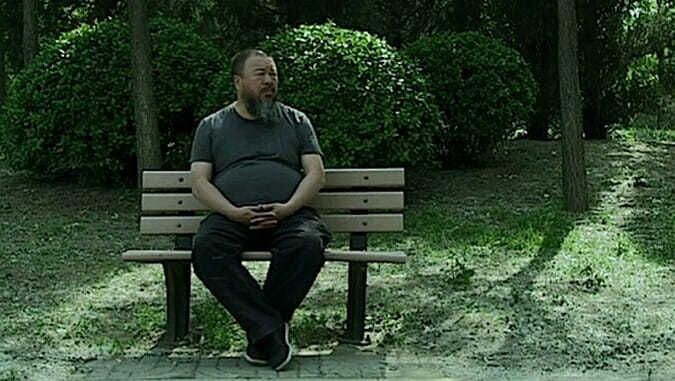Ai Weiwei: The Fake Case

Chronicling some of the very tangible costs of dissident behavior in societies much less freer than ours, Danish filmmaker Andreas Johnsen’s Ai Weiwei: The Fake Case is an absorbing nonfiction look at renowned Chinese multimedia artist Ai Weiwei, who, after just under three months of isolated imprisonment with no formal charges, is transferred to house arrest and put on a year’s probation, barred from giving interviews or having a domestic online presence.
Alison Klayman’s superb 2012 documentary, Ai Weiwei: Never Sorry, offered up a much more rounded portrait of the man as an artist, though that film also dealt heavily with the political activism (including spearheading a citizens’ investigation into the more than 5,400 children who were killed in the 2008 Sichuan earthquake, in large part owing to shoddy government construction) which landed Ai in trouble with Chinese authorities. Following a contentious arrest, Klayman’s film actually ends with Ai emerging from his aforementioned confinement.
Ai Weiwei: The Fake Case, then, tracks his cautious reemergence and attempts to come to grips with the emotional and physical fallout (sleep difficulties, a fog of depression) stemming from his detention. It takes its title from the fact that Ai’s company, Fake Limited, is also saddled with a dubious $2.5 million tax fraud case. When he has to pre-pay a $1.5 million bond in order to appeal the sentence (whether this is part of the Chinese court system or yet another special contrivance created just for Ai isn’t quite clear, though the harassment of the sole defense attorney who doesn’t abandon him makes clear that the deck is certainly stacked), supporters make paper airplanes out of currency and lob their donations into his courtyard.
For better or worse, Johnsen’s film is less a study of China as a society in flux, and more an unobtrusive document of personality; while Ai and some of his friends (foreigners and Chinese citizens alike) wax about the inability of disenfranchised farmers to connect with one another, and foment dialogue of dissent and social change, the movie basically clings to its subject’s travails, and doesn’t make an attempt to expand its field of vision to include the people Ai inspires. Other parts of the film detail his burgeoning family commitments and responsibility; we see him spending time with the son, Ai Lao, fathered by mistress Wang Fen (though we don’t see his longtime wife and fellow artist Lu Qing).
-

-

-

-

-

-

-

-

-

-

-

-

-

-

-

-

-

-

-

-

-

-

-

-

-

-

-

-

-

-

-

-

-

-

-

-

-

-

-

-








































